Imagine you’re at a café, enjoying your latte while typing your credit card details online. It seems safe, but it’s not. Without encryption, your data is exposed, like a postcard with your bank PIN. This is where VPNs and encryption come in to protect you.
Hackers, advertisers, and public Wi-Fi networks all track your privacy. Tools like NordVPN hide your IP address and encrypt your data. They also block leaks. Features like split tunneling and kill switches keep your online activities safe.
New tech like AI and IoT brings new risks, but there are solutions. Cloud storage with end-to-end encryption and private search engines like DuckDuckGo block trackers. Even simple steps, like enabling 2FA, add protection. This guide will help you choose the right tools, from VPNs to encryption for everyday apps.
The rising threat to digital privacy in 2025.
Online security is facing a big challenge. Data breaches, invasive laws, and corporate greed are all causing problems. Millions of people are at risk from hackers, governments, and businesses.
They are using personal information for identity theft, fraud, and privacy erosion. We need to act fast to protect our data.
These privacy tools and practices aren’t just for activists and journalists, they’re essential for anyone valuing their privacy rights or concerned about government overreach. Whether protecting health information, personal communications, or exercising basic privacy rights, these measures offer important protection in today’s connected world.
Récent data breaches that made headlines.
2023 was a bad year for data breaches:
- A healthcare provider leaked 10 million patient records.
- A major retailer exposed 20 million payment details.
- University databases compromised 5 million student files.
Weak data protection practices made these breaches possible.
New surveillance législation on the horizon.
New laws could harm privacy:
- U.S. EARN IT Act: Could force platforms to allow law enforcement access to encrypted messages.
- EU Digital Services Act: Requires sharing of user data with regulators.
The commercialization of personal data.
| Issue | Statistic | Impact |
|---|---|---|
| GDPR non-compliance | 74% of European sites | Opt-in ignored |
| CPRA non-compliance | 76% of U.S. sites | Opt-outs not honored |
| Data sharing without consent | 99% of cases | Ad networks exploit users |
Companies like Facebook and Google sell our browsing habits to advertisers. Data brokers like Acxiom and Experian trade our profiles without asking. Weak data protection lets this happen.
Why do you need to équip yourself VPNs, encryption and privacy?
Now that we’ve talked about the dangers to internet privacy, it’s time to talk about defense. Virtual private networks (VPNs), encryption, and smart habits are your shield against digital threats. VPNs hide your online identity, while encryption scrambles your data, creating strong protection.
“VPNs protect your privacy by encrypting your internet traffic… scrambling data so no one can see what you’re doing.”said even ISPs or governments.” They hide your IP address, making your online activity untraceable.””
Think of it like a digital armor kit: VPNs encrypt data as it travels. Encryption protocols like AES-256 lock content, so only you and the recipient can read it. Privacy practices like two-factor authentication add extra security. Together, they make your browsing safe.
- VPNs mask your IP address, replacing it with a server’s location
- Encryption converts data into unreadable code until it reaches its destination
- No-logs policies and kill switches in premium VPNs block tracking and data retention
Setting up these tools is easy. Many VPNs offer one-click apps, and encryption is in tools like Signal or ProtonMail. The goal is to start small. Enable privacy modes in browsers, choose a trusted VPN, and let these tools work for you. Your digital footprint will shrink, and your online activity will stay private. Next, we’ll explore how each tool works in detail.
Understanding virtual private networks (VPNs).
Imagine sending a letter through a trusted service. VPNs do the same thing with your internet traffic. They send it through secure servers to hide your IP address and encrypt your data. This makes your online activity private from hackers and ISPs.
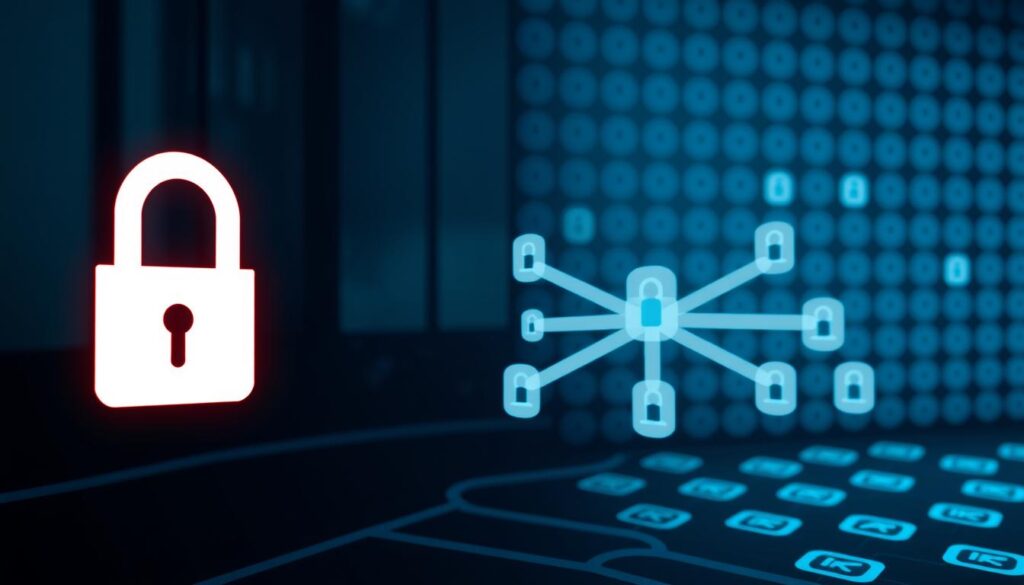
How VPNS protect your internet activity?
Connecting to a VPN means all your data goes through an encrypted tunnel. This keeps your emails, passwords, and browsing history safe from others. Plus, a “no-log” policy means providers don’t keep records of your online activities.
Features like kill switches also protect you. They block your internet if the VPN connection fails.
Types of VPN protocols.
Not all VPNs are the same. You need to pick the right protocol for your needs:
| Protocol | Security | Speed | Compatibility |
|---|---|---|---|
| OpenVPN | High (AES-256) | Moderate | Most devices |
| WireGuard | High | Fast | Newer devices |
| IKEv2/IPSec | Secure | Fast | Depends on platform |
Limitations of VPN technology.
- VPN can’t protect against malware or phishing attempts.
- Browser fingerprinting may still track users despite encryption.
- Some apps bypass VPN protection, leaving data exposed.
Look for providers with regular updates and strict privacy policies. This helps reduce risks. Always use VPN with antivirus software for complete protection.
The fundamentals of data encryption.
Encryption is like a digital secret code. It turns your data into unreadable text when you send messages or log into apps. Only those with the right decryption key can make it readable again. This is key to keeping your data safe online, from emails to banking.
Modern encryption uses strong algorithms like AES-256. Even governments find it hard to break. Think of it as a lockbox: your data is the box, and the encryption key is the combination. Without the key, hackers have a tough time.
- OpenVPN: Reliable but slower.
- WireGuard: Fast and modern.
- IKEv2/IPSec: Ideal for mobile networks.
Data protection relies on using encryption right. Yet, over 69% of users connect to public Wi-Fi without protection. This puts their data at risk. End-to-end encryption makes sure only the sender and receiver can read messages, which is why apps like Signal or WhatsApp are so secure.
Encryption isn’t just for spies, it’s for everyone to protect their data. By choosing services with AES-256 and checking for end-to-end encryption, you can greatly improve your online security.
End-to-end encryption: why it matters for everyday communication.
Everyday chats, emails, and calls need protection. End-to-end encryption makes sure only you and your recipient see messages. This is different from basic transport encryption, which leaves data open to service providers. With 73% of users worried about data leaks and big breaches like British Airways’ £183M penalty, using encryption is key. Encryption is a key solution for protecting sensitive data, keeping everything from private plans to financial details safe.
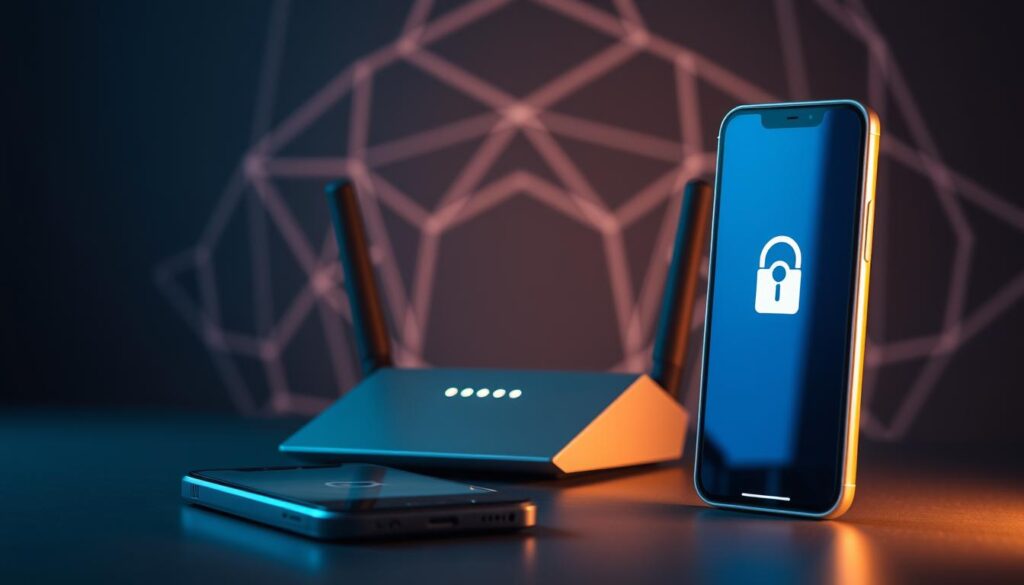
Start with secure messaging apps. Signal is a top choice for privacy: it doesn’t store metadata and messages can self-destruct. WhatsApp and iMessage also offer E2E encryption but keep some data. Pick the one that fits your needs best.
| App | Encryption | Key Features |
|---|---|---|
| Signal | End-to end | No ads, no metadata, customizable message expiration |
| E2E for chats, not calls | Widespread use but shares some data with Meta | |
| iMessage | Apple’s E2E for messages | Limited to Apple devices, no third-party audits |
Encrypted messaging apps worth considering.
- Signal: Best privacy (no ads, no metadata).
- ProtonMail: E2E email with zero-access architecture.
- Zoom: Enable E2E encryption in settings for calls.
Email encryption tools for enhanced privacy.
For emails, ProtonMail and Tutanota use E2E encryption without storing decryption keys. Advanced users can try Pretty Good Privacy (PGP), though it requires setup. SmythOS also integrates secure AI tools for encrypted email workflows.
Voice and vidéo call encryption options.
Video calls on apps like Signal and Zoom (with E2E enabled) prevent eavesdropping. Always check app settings to ensure encryption is active. Avoid unencrypted platforms like standard Skype calls.
Encryption ensures only you and your recipient hold keys to your conversations.
Use these privacy tools with regular software updates to close security gaps. Protecting communications isn’t just for spies, it’s essential for everyone.
Sécure browsing: beyond the basic incognito mode.
Incognito modes hide your browsing history from others using your device. But, they don’t keep your internet privacy safe from others. To really protect your privacy, try these methods:
Browser extensions that enhance privacy.
- uBlock Origin: Blocks ads and trackers automatically.
- Privacy Badger: Stops cross-site tracking by major platforms.
- HTTPS Everywhere: Encrypts connections to support HTTPS sites.
Alternative privacy-focused browsers.
| Browser | Key features | App store rating | VPN cost |
|---|---|---|---|
| Brave | Blocks ads/fingerprinting, Tor mode, 4.7/4.8 ratings | 4.7/4.8 | $5.99/month (VPN) |
| DuckDuckGo | Tracker blocking, integrated search engine, 4.7/4.1 ratings | 4.7/4.1 | $10/year (VPN) |
| Firefox | Enhanced tracking protection, 4.6/4.5 ratings | 4.6/4.5 | $4.99/month (VPN) |
Advanced browser settings for privacy protection.
- Disable WebRTC in Chrome settings to prevent IP leaks.
- Enable “Do Not Track” headers in all browsers.
- Use “Content Blocking” in Safari to restrict tracker access.
Norton 360’s built-in VPN adds extra protection with SONAR malware detection, priced at $4.17/month. Always pair these tools with strong passwords and two-factor authentication for layered defense.
Password managers: the first line of digital défense.
Password managers are key for keeping your online security safe. With 65% of users using the same password everywhere, weak passwords are a big risk. A good manager keeps your passwords safe and unique, protecting your cyber privacy.
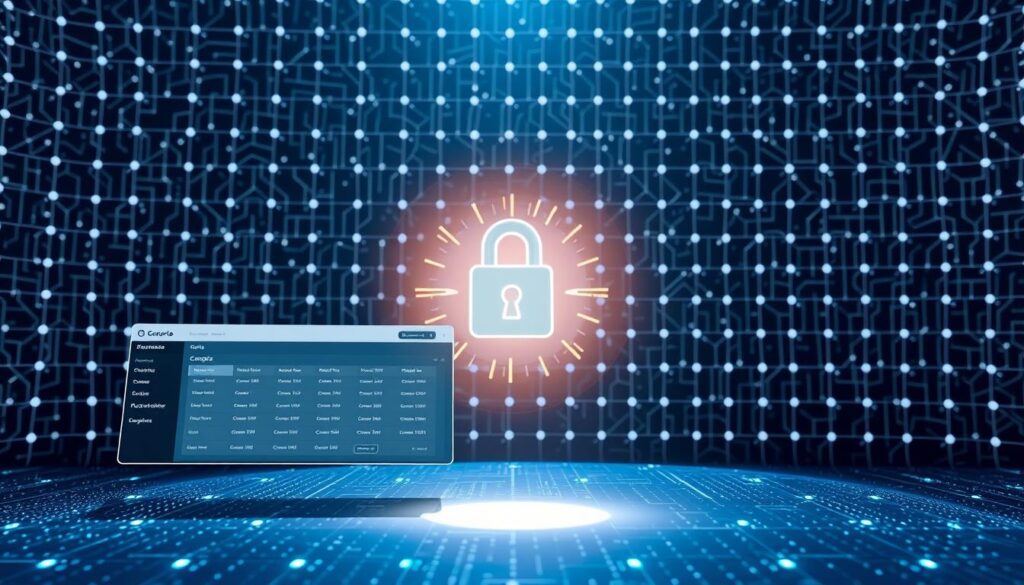
Some worry about storing all passwords in one place. But, top services use strong encryption and two-factor authentication. This way, even if a manager is hacked, your passwords stay safe, unlike those stored in browsers.
- Bitwarden: Free open-source option with family plans.
- LastPass: Cross-platform support and emergency access features.
- 1Password: Auto-fills forms and generates 12+ character passwords with random symbols.
Setting up a password manager is quick. Just create a strong master password, turn on MFA, and let it check your passwords. Browsers don’t keep passwords as securely as managers do, so switching helps protect you from phishing and leaks.
With a password manager, you don’t have to choose between easy and safe. They’re the first step in a strong cyber privacy plan, replacing weak passwords with strong, random ones.
Two-factor authentication: adding an extra layer of sécurity.
Two-factor authentication (2FA) makes your online security stronger by needing two ways to verify. This simple step stops 99.9% of automated attacks, says Microsoft. Use a password and something you own or are, like a security key or fingerprint, to keep your accounts safe from hackers.
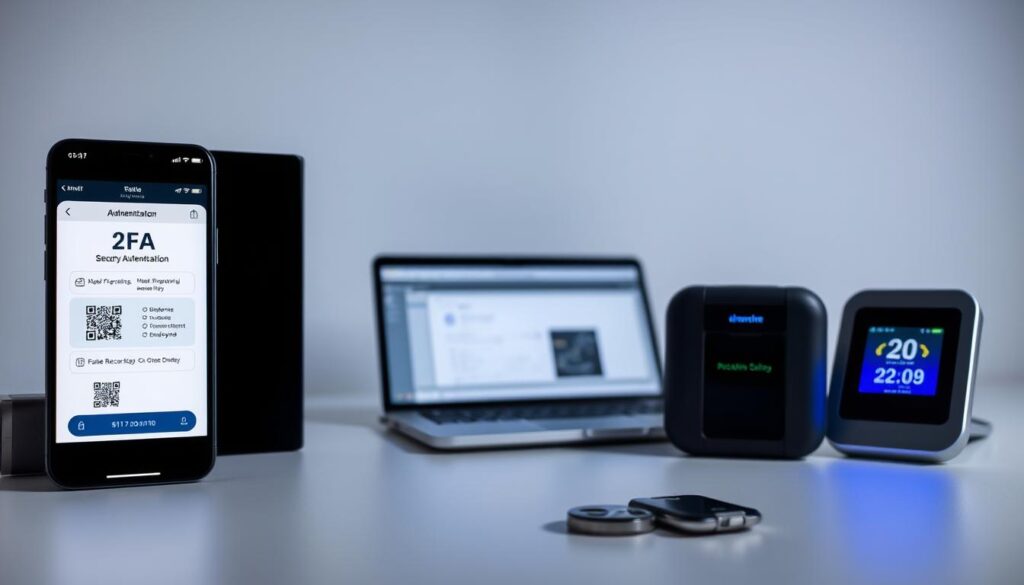
| Method | Strength | Convenience | Best use |
|---|---|---|---|
| SMS Codes | Weak | Easy | Temporary backup |
| Authenticator Apps | Strong | Quick | Primary method |
| Hardware Keys | Strongest | Physical access | High-value accounts |
| Biometrics | High | Instant | Regular logins |
Hardware authentication options.
Physical privacy tools like YubiKey or Google Titan Security Key give top-notch protection. Just plug these USB or NFC devices into your computer to approve logins. For iOS users, Lockdown Mode limits unauthorized access to device biometrics. Use hardware keys with authenticator apps for extra security.
- YubiKey: Works across devices and services.
- Google Titan: Supports FIDO2 standards and Bluetooth.
- Authy: Cross-platform app for generating codes.
Biométric authentication: convénience versus sécurity.
Biometric data can be copied, but it’s still better than no 2FA at all.
Fingerprints or facial scans make logging in faster but have risks if stolen. Use biometrics for everyday logins but don’t store them in unsafe apps. Always pair biometrics with a hardware key for sensitive accounts.
Turn on 2FA for Google, Apple, and financial apps. Use backup codes for lost devices. Choose privacy tools that are safe and easy to use, your data’s safety depends on it.
Data protection stratégies for mobile devices.
Mobile devices are full of personal data, making them a big target for cyber threats. Smartphones collect lots of information like location, contacts, and even biometric data. This makes data protection very important for keeping your cyber privacy safe. Here are some tips to protect your data without giving up convenience.
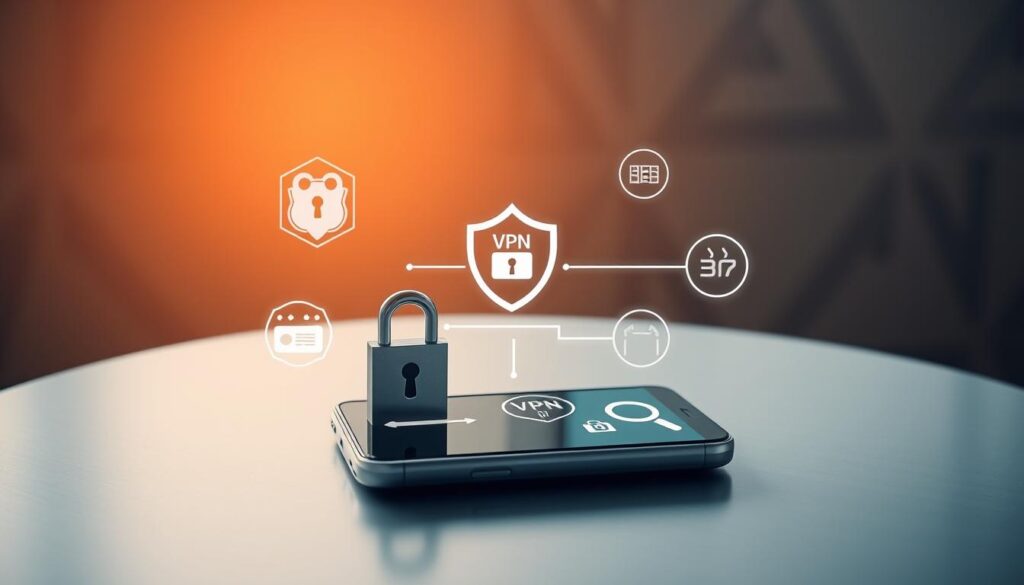
- Compare OS Privacy Features: iOS and Android have different ways to protect your privacy. Apple’s iOS encrypts Messages by default, while Android’s Privacy Dashboard shows app data access. Both let you limit app permissions to keep your data safe.
- Limit App Permissions: Check app permissions in your device settings often. Limit location access for apps that don’t need it, like weather apps. Turn off camera/microphone for apps that don’t use them.
Here are more steps to improve your security:
- Turn off automatic location logging in settings.
- Remove unused apps to lower data risk.
- Use Faraday bags to block signals when storing devices.
- Enable screen locks with biometrics or long passcodes.
“A locked phone is a thief’s roadblock,” says cybersecurity expert Sarah Johnson. “Combine strong passcodes with permission audits for layered protection.”
For even more security, get privacy apps like Signal for encrypted messages and DuckDuckGo for tracking prevention. By balancing use with caution, you can keep your digital life safe while on the move.
The dark side of public Wi-Fi and how to stay protected.
Public Wi-Fi hotspots might seem convenient, but they pose serious risks to online security. Unsecured networks make it easy for hackers to intercept data, like passwords or bank details, shared over the air. Cybercriminals use tactics such as “man-in-the-middle” attacks or fake “evil twin” networks to trick users into revealing sensitive information.
When using public Wi-Fi, avoid logging into accounts with personal or financial data. Attackers can exploit unencrypted connections to steal this information. Even routine activities like browsing social media or checking emails can leave traces of your activity exposed. Here’s how to stay safe:
- Use VPN to encrypt all traffic. Services like ExpressVPN or NordVPN create secure tunnels blocking outsiders from spying on your data.
- Enable HTTPS only in browsers. Look for the padlock icon to confirm websites use encryption.
- Turn off auto-connect features to prevent devices from joining unsecured networks without your consent.
- Delay sensitive tasks, banking, shopping, to password-protected home or work networks.
Public Wi-Fi providers may also share user data with advertisers or third parties. Even “free” networks come with hidden costs. Regularly updating device software closes security gaps that hackers could exploit. By combining vigilance and tools like VPN, you can enjoy public internet without compromising privacy.
Privacy tools for social média users.
Managing internet privacy on social media starts with controlling what platforms collect. Big names like Facebook and Instagram often share data widely. But, you can adjust settings to share less without leaving the platform.
Limiting data collection on major platforms.
Most platforms hide important privacy settings. Here’s how to find them:
- Disable ad tracking in account settings to stop data sharing with advertisers.
- Review app permissions to block third-party access to contacts or location.
- Use privacy tools like Privacy Bee to remove personal data from brokers.
Tools that minimize digital footprints.
AI-driven privacy tools make protection easier:
- Install browser extensions like Privacy Badger to block trackers.
- Enable AI alerts via services like Have I Been Pwned for breach notifications.
- Use encrypted messaging apps like Signal to avoid data logging.
Alternative privacy-focused social networks.
Look into these platforms that focus on user control:
| Platform | Key features | Privacy focus |
|---|---|---|
| Mastodon | Federated networks, no ad tracking | Open-source code |
| MeWe | End-to-end encrypted chats | Optional pseudonymous accounts |
| Session | No data monetization | Ad-free experience |
Small changes can help keep your social life private. Tools like Privacy Bee and Mastodon help you take back control. You don’t have to leave social media to do it.
Internet of things (IoT): sécuring your smart home.
Smart devices like security cameras and voice assistants make life easier. But they also bring risks to our cyber privacy. These gadgets gather data on our routines and conversations, which is why protecting our data is key. Hackers can get into this information by using weak passwords or outdated software.
- Use a separate network for IoT devices to isolate them from primary home networks.
- Update firmware regularly to patch security gaps.
- Replace default passwords with complex, unique combinations.
- Disable unused features like microphones on smart speakers when not in use.
- Choose brands with transparent privacy policies, such as Nest or Ring, which offer encryption options.
| Device type | Key sécurity steps |
|---|---|
| Smart Cameras | Enable encrypted cloud storage and use physical lens covers |
| Smart Locks | Verify Bluetooth/Wi-Fi encryption standards before purchase |
| Smart Plugs | Limit app permissions to only necessary functions |
Zero Trust Architecture (ZTA) is also important here. It means we should always assume devices are not safe. Unplug devices you don’t use and keep an eye on app permissions. Choose brands like Philips Hue or August Smart Lock for their strong encryption.
Regularly check your connected devices and remove old ones to lower risks. Finding a balance between convenience and cyber privacy means making smart choices. We need to protect our data without giving up the benefits of smart technology.
Légal rights to privacy: what Américans should know.
Knowing your privacy rights begins with understanding the laws that govern your digital life. The U.S. does not have a single privacy law for the whole country. But, states are stepping up with their own laws.
State-level privacy laws in the US.
In California, the California Consumer Privacy Act (CCPA) lets people ask for their data to be deleted and choose not to sell it. Virginia’s Consumer Data Protection Act gives similar rights, like the ability to take your data with you. Other states like Colorado and Connecticut are also making their own rules. Here’s a quick look:
| State | Law | Key rights |
|---|---|---|
| California | CCPA | Access, deletion, opt-out of sales |
| Virginia | CDPA | Access, correction, deletion |
| Colorado | CPA | Data access, correction, and restrictions on data use |
How to exercise your digital privacy rights?
Here’s what you can do today:
- Send privacy requests through company websites to find out what data they have.
- Use tools like Cloaked to manage your data and block trackers.
- Report any privacy violations to the FTC or your state’s attorney general.
These laws are a good start, but you need to stay alert. Keep up with changes to protect your online security and data. Your rights are there, make sure to use them!
The cost of privacy: free versus paid sécurity solutions.
Deciding between free and paid privacy tools is crucial for online safety. Free virtual private networks (VPN) might seem good, but they sell your data to advertisers. Paid services, on the other hand, give real benefits without hidden costs.
Paid virtual private networks like ProtonVPN and NordVPN offer strong encryption and many servers worldwide. Brands like Private Internet Access (PIA) provide unlimited connections and top-notch encryption for just $2.50/month. Free options usually don’t have these key features, like no-logs policies or support for many devices.
| Feature | Free tools | Paid options |
|---|---|---|
| Encryption | Basic or none | AES-256 (e.g., PIA, NordVPN) |
| Server Count | 100s | Over 35,000 (PIA) |
| Data Monetization | Common | Rare (ProtonVPN, NordVPN) |
Popular paid privacy tools include:
- Private Internet Access: 91-country server network, 30-day refund guarantee.
- NordVPN: Double encryption, 7,000+ servers, Lightway protocol.
- ProtonVPN: Budget-friendly, open-source apps, EU-based.
“A $10/month investment in a trusted virtual private network is small compared to the risks of identity theft,” advises cybersecurity analyst Sarah Lin.
Those with high-risk activities (e.g., remote work, travel) might choose premium plans. Others can start with free steps: use browser privacy modes, HTTPS, and adjust social media settings. These steps cost nothing but time.
Conclusion: building your personal digital privacy stratégy.
Protecting online security and privacy needs a multi-layered plan. Begin with basics: turn on two-factor authentication, use password managers, and keep software up to date. These steps help protect against common dangers like data breaches and phishing.
Then, add more layers. Choose encrypted messaging apps like Signal, use a VPN for public Wi-Fi, and pick privacy-focused browsers like Brave. These tools stop third-party tracking and secure your messages, boosting online security. For those who want more, consider separating devices or using Tor for sensitive activities.
No single tool can ensure complete privacy. Focus on steps that fit your personal risks. For example, if you travel a lot, a good VPN is crucial. If you handle sensitive data, be extra cautious. Always check your settings, limit what you share on social media, and keep up with new threats. Small steps now can lead to stronger privacy later.
It’s important to find a balance between ease and safety. Start with one or two steps, then add more. Each change helps reduce your risk of being hacked or watched. Treat your digital life with the same care as your physical one. Begin today and adjust as technology and threats change.
To better prepare yourself, discover our article on the new dangers of ransomware.
FAQ
Why is encryption important for my personal data?
Encryption turns your data into unreadable code. Only with the right key can it be read again. This keeps your personal info safe from hackers, which is crucial for online banking and messaging.
What is end-to-end encryption, and how does it differ from regular encryption?
End-to-end encryption locks data on your device and unlocks it only on the recipient’s. Unlike regular encryption, it stops others from seeing your messages. It’s a more secure way to send messages.
How can I improve my privacy on public Wi-Fi?
Avoid sensitive activities on public Wi-Fi. Use a VPN if you must, check the network’s authenticity, and make sure it’s HTTPS.
How can I secure my smart home devices?
Keep your IoT devices safe by updating their software and changing passwords. Use separate networks for smart devices and disable unused features.
Are free privacy tools as effective as paid ones?
Free tools can work well, but they might have limits or sell your data. Always check what each tool offers and consider the trade-offs between free and paid options.


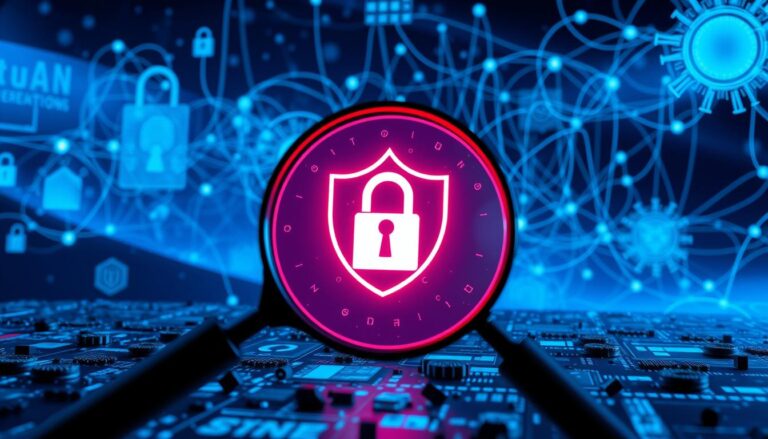


[…] Data privacy and security are big issues with smart parking systems. They collect and analyze a lot of data, including personal info. Cities must protect this data to keep public trust. […]